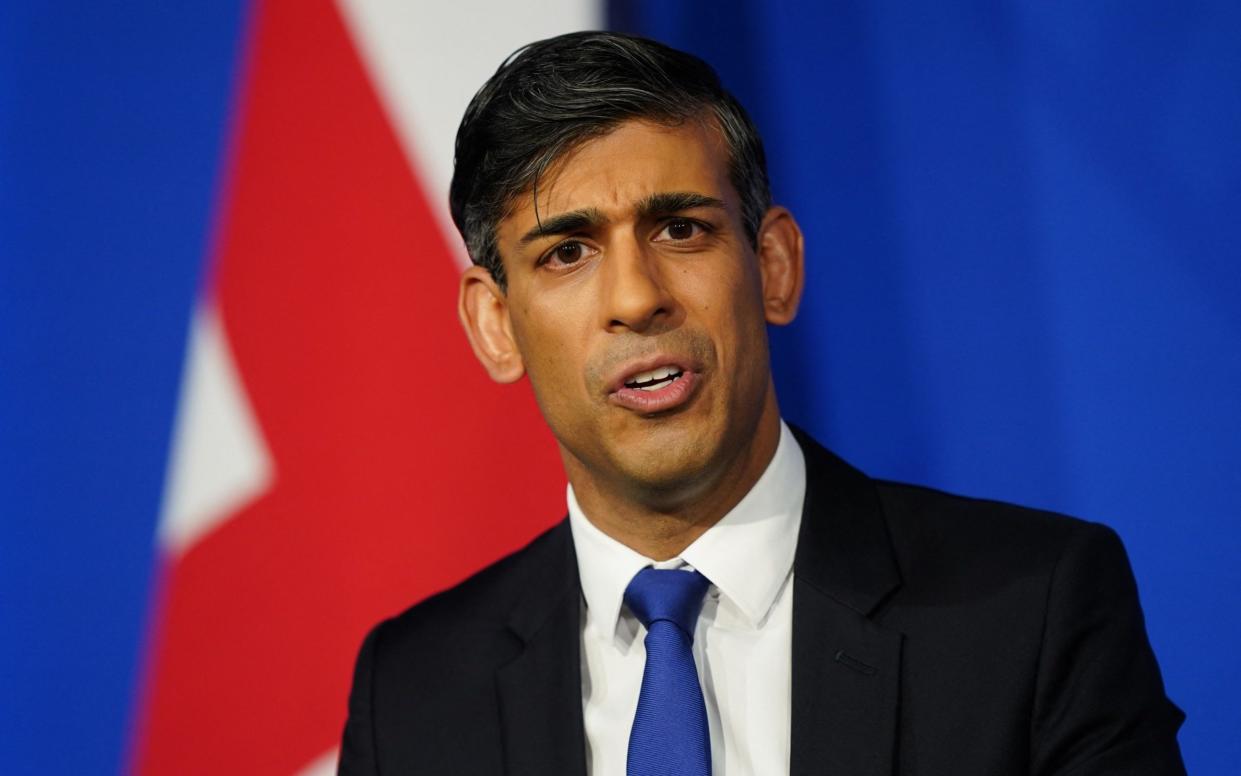Tories urge Sunak to focus on slashing income tax

- Oops!Something went wrong.Please try again later.
- Oops!Something went wrong.Please try again later.
Downing Street is facing a backlash over its consideration of abolishing inheritance tax as Conservative MPs called for reducing income tax to be the focus instead.
Both Jonathan Gullis, the Tory MP for Stoke-on-Trent North, and Neil O’Brien, the former health minister, tweeted on Wednesday arguing for income tax cuts.
The interventions came after The Telegraph reported that axing inheritance tax was being seriously considered for the spring Budget as a pre-election giveaway is planned.
The reaction from some Tory politicians exemplifies the debate going on inside the Conservative Party about which tax cuts to prioritise before voters go to the polls.
The same debates are playing out inside No 10 itself, with both the economic impact and potential political boost being factors in the discussions.
Prioritise income tax cut
Reducing the 20 per cent basic rate of income tax and raising the threshold at which people start to pay the higher 40 per cent income tax band are also being explored by No 10.
Final decisions are unlikely to be taken until March, when the Budget – potentially the last major fiscal event before the general election – is expected to be held.
Mr Gullis tweeted: “Axing inheritance tax is something we should do, just not yet. Tax cuts for Spring 2024 I’d prefer us to prioritise: Raise the higher rate income tax threshold; Cut the basic rate of income tax; Scrap IR35 reforms; Increase VAT registration threshold to £250,000.”
Mr O’Brien wrote that “people most want to cut taxes that fall on low to middle earners and council tax and VAT”.
He included a graph from the pollster Ipsos Mori from June showing that voters would prefer tax cuts on income, council tax, VAT, fuel duty and national insurance ahead of inheritance tax.
People most want to cut taxes that fall on low to middle earners & council tax and VAThttps://t.co/s6MPOMILgx pic.twitter.com/JqeVQONXdy
— Neil O'Brien MP (@NeilDotObrien) December 27, 2023
Mr O’Brien also reposted a comment from another Twitter user who said they were “amazed” that inheritance tax abolition was still being looked at by Downing Street.
Meanwhile Damian Green, who heads up the One Nation group of moderate Tory MPs, called for help getting first-time buyers onto the property ladder to be the priority in the Budget.
Mr Green told The Telegraph about interest in abolishing inheritance tax: “I would put helping people become home owners as the absolute top priority for whatever money the Chancellor has.”
The comments reflect just one side of the tax debate inside the Tory party. The Conservative MPs Ranil Jayawardena and David Jones have already welcomed a potential inheritance tax cut.
Income taxes are paid by many more people than inheritance tax, meaning the political upside of reductions there could in theory be greater.
Just 4 per cent of estates paid inheritance tax in 2021, according to HMRC figures. Some 32 million people paid income tax in 2022, with four million of those people paying the 40 per cent higher rate.
‘Desperate briefing from desperate PM’
However Labour insiders have indicated that the party would be much more likely to match income tax reductions adopted by the Tories before the election than the abolition of inheritance tax.
Should Labour promise not to reverse any income tax reductions announced, as they have done with the National Insurance tax cut unveiled in November, its political benefit for the Tories could be blunted.
James Murray MP, Labour’s shadow financial secretary to the Treasury, reacted to reports that the abolition of inheritance tax was being considered: “This is a desperate briefing from a desperate prime minister who is spending his Christmas break trying to keep Tory MPs on side.
“There have been 25 Tory tax rises since the last election. Now at a time when families across Britain are struggling with the cost of living and our NHS is on its knees, Rishi Sunak is trying to buy off his backbenchers with an unfunded tax cut for millionaires.”
The overall tax burden, calculated from tax revenue as a percentage of GDP, continues to be forecasted to hit highs not seen since the late 1940s, despite new tax cuts in the autumn.

